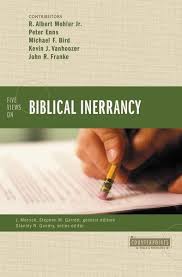In the Words of the Deniers: Inerrancy is the Historic View


There is a series published by Zondervan entitled Counterpoints. Several perspectives are presented on different theological issues. From that series, I’ve been reading Five Views on Biblical Inerrancy. Albert Mohler has the first essay in this volume. Most of his contribution is quite run-of-the-mill — nothing surprising to those who’ve followed this topic. He discusses the history of discussions about inerrancy. He notes the Rogers & McKim thesis that inerrancy is something relatively new in Christian theology. But then he pulls out something that was for me a new revelation.
Identical twin brothers Anthony and Richard Hanson are both ordained Anglican ministers. In 1989, they co-authored a book entitled The Bible without Illusions. In this book, the brothers Hanson reject not only inerrancy, but even the divine inspiration of the Scriptures. Yet, they have a remarkable honesty about the history of the discussion. Mohler quotes these words directly:
Again, as we have seen, the writers of the New Testament certainly believed in the inerrancy of the Old Testament, which constituted for them the scriptures. The Christian Fathers and the medieval tradition continued this belief, and the Reformation did nothing to weaken it. On the contrary, since for many reformed theologians the authority of the Bible took the place which the Pope had held in the medieval scheme of things, the inerrancy of the Bible came to be more firmly maintained and explicitly defined among some reformed theologians than it had ever been before. Only since the very end of the seventeenth century, with the rise of biblical criticism, has this belief in the inerrancy of Scripture been widely challenged among Christians. (Hanson and Hanson, 51-52)
Rejecting biblical inerrancy is the recent development, not affirming it! Remember, that comes from men who are denying inerrancy. Even they recognize that the Rogers & McKim thesis is not tenable.


